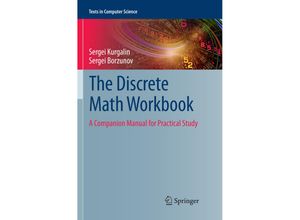This practically-oriented textbook presents an accessible introduction to discrete mathematics
through a substantial collection of classroom-tested exercises. Each chapter opens with concise
coverage of the theory underlying the topic reviewing the basic concepts and establishing the
terminology as well as providing the key formulae and instructions on their use. This is then
followed by a detailed account of the most common problems in the area before the reader is
invited to practice solving such problems for themselves through a varied series of questions
and assignments.Topics and features: provides an extensive set of exercises and examples of
varying levels of complexity suitable for both laboratory practical training and self-study
offers detailed solutions to many problems applying commonly-used methods and computational
schemes introduces the fundamentals of mathematical logic the theory of algorithms Boolean
algebra graph theory sets relations functions and combinatorics presents more advanced
material on the design and analysis of algorithms including asymptotic analysis and parallel
algorithms includes reference lists of trigonometric and finite summation formulae in an
appendix together with basic rules for differential and integral calculus. This hands-on study
guide is designed to address the core needs of undergraduate students training in computer
science informatics and electronic engineering emphasizing the skills required to develop
and implement an algorithm in a specific programming language.



